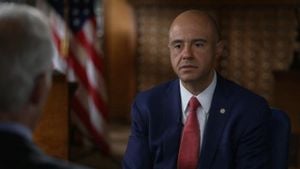Meta Platforms, the parent company of Facebook, finds itself at the center of legal turmoil as it prepares for trial surrounding claims of antitrust violations associated with its acquisitions of Instagram and WhatsApp. On November 13, 2024, U.S. District Judge James Boasberg ruled against Meta's attempts to dismiss the case initiated by the Federal Trade Commission (FTC), stating the agency presented enough evidence to warrant proceeding to trial.
The legal saga began when the FTC first filed its lawsuit back in December 2020, highlighting concerns over Meta’s acquisition strategy. According to the commission, the purchases of Instagram in 2012 and WhatsApp in 2014 enabled Meta to suppress potential competition and maintain its dominance within the social media arena. The FTC argued these acquisitions weren't merely strategic business moves but rather tactics to eliminate competitors.
Judge Boasberg’s ruling highlighted this argument, as he noted the FTC's claims adequately pointed to Meta's actions fostering barriers to entry for other firms eager to challenge its market share. These barriers, often termed 'moats,' protect dominant companies from competition, allowing them to earn excess returns without facing the traditional market pressures.
During the initial complaint, Meta contended its acquisitions actually bolstered competition within the tech industry, asserting they enhanced its ability to compete against giants like Google and Apple. Despite these claims, the FTC emphasized the negative impacts on consumers, positing the company has intensified its monopolistic grip over social networking services.
After Judge Boasberg dismissed the initial FTC lawsuit and later permitted the amended complaint, the stage was set for more rigorous court battles. The amended lawsuit presented what the judge referred to as “more detailed” evidence of Meta’s potentially monopolistic practices.
Meta’s spokesperson responded to the latest ruling, expressing confidence the trial would demonstrate the benefits of their acquisitions, stating, “More than 10 years after the FTC reviewed and cleared these deals, the Commission is wrongly continuing to assert... businesses can be punished for innovated.” This assertion indicates Meta’s belief their growth strategies reflect sound business development instead of anti-competitive behaviors.
The trial will now examine whether Meta's practices are harming competition and limiting consumer options. This could lead to significant consequences, including the potential breakup of Meta—which might involve divesting Instagram and WhatsApp, two of its most lucrative assets. Such a move could reshape the overall social media environment significantly.
The legal battle is part of broader aggressive actions taken by U.S. regulators under President Joe Biden, who is making large tech companies, such as Amazon and Google, the target of scrutiny for their market practices. Notably, Amazon faces its own antitrust issues accusing the e-commerce titan of employing unfair competitive strategies.
Boasberg added another layer to the complexity surrounding the trial when he pointed out potential difficulties for the FTC. It might be challenging for regulators to definitively show how consumers have been negatively impacted by the acquisitions. Meta has built its business model on advertisement revenue without charging users for service, compliciting the established framework of traditional antitrust cases where pricing and output directly affect consumers.
Analysts suggest the FTC faces substantial hurdles, not only proving consumer harm but also the challenges of unwinding integrated platforms at this stage. The longstanding integration and reliance of WhatsApp and Instagram within Meta's broader ecosystem mean unraveling these may have its own consequences for users and services.
The next conference is scheduled for November 25, where the trial's timelines and specific proceedings will be discussed. Meanwhile, the case not only reflects the growing tension between regulators and tech giants but also marks pivotal moments for Meta as it navigates through this precarious legal minefield, with significant repercussions awaiting the outcome.
With tech-related antitrust disputes on the rise, many are watching closely to see what the outcome of this trial yields, not just for Meta, but for all players within the technology sector. The future of social networking, consumer choice, and competition hang precariously as companies rethink their strategies amid increasing regulatory scrutiny. The convergence of innovation with legal challenges reveals how intertwined these realms have become, setting the stage for continued debate on what constitutes fair competition.
Future developments will offer insights not only on Meta’s fate but also on the future of antitrust regulations as they apply to rapidly advancing technology. The stakes are high, and the ramifications of the trial could alter the regulatory approach toward tech acquisitions and mergers for years to come.
While Meta prepares its legal defense, the trial's outcome remains uncertain and could pivotally affect the company’s structure and the very nature of its services. What is clear is the attention this case garners will extend beyond courtrooms; it will impact how social media platforms operate and compete moving forward.



